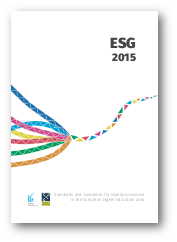Standards and Guidelines for Quality Assurance in the European Higher Education Area (ESG)
At the European Higher Education Area (EHEA) Ministerial Meeting in Bucharest, on 26 and 27 April 2012, the ministers acknowledged the report prepared by ENQA, ESU, EUA and EURASHE (the E4 group) on the implementation and application of the “European Standards and Guidelines for Quality Assurance” (ESG).
Ministers mandated the E4 group in cooperation with Education International, BUSINESSEUROPE and the European Quality Assurance Register for Higher Education (EQAR) to revise the ESG in order “to improve their clarity, applicability and usefulness, including their scope” and submit their proposal to the Bologna Follow-Up Group (BFUG).

14-15 May 2015: Ministers of the EHEA gathered in Yerevan for the Ministerial Conference and adopted the Yerevan Communiqué, which includes the Standards and Guidelines for Quality Assurance in the European Higher Education Area (ESG).
The final, adopted version can be downloaded here.
The revised version of the ESG was presented by the seven organisations to the BFUG after several consultation rounds involving both the key stakeholder organisations and ministries. The many comments, proposals and recommendations received have been very useful and of extremely importance for the revision process. They are reflected in the resulting revised version.
As requested by Ministers, the revised version make the ESG clearer, particularly in terms of their structure and in order to avoid potential confusion with their interpretation. The revised ESG also make a more explicit link to the learning and teaching process in the section on internal QA, and defines the relationship of QAwith other Bologna Process developments that have taken place since 2005 (including those relating to Qualifications Frameworks and learning outcomes).
The revised version of the ESG was endorsed by the BFUG on 19 September 2014. It is subject to approval by the EHEA Ministerial Conference on 14/15 May 2015 in Yerevan (Armenia).
The EQAR Register Committee adopted a Policy on Transition to the Revised ESG, concerning registration and renewal of registration of quality assurance agencies. The policy aims to ensure that by 2020 all agencies on the Register will have been reviewed against the revised ESG.
Initial applications based on the current ESG are only possible until 15 March 2015, i.e. the last application deadline before approval of the revised version. Thereafter, all initial applications need to be based on the revised ESG.
Registered agencies that have their registration expiring between 1/1/2015 and 31/12/2016 have to renew their registration based on the revised ESG. They can have their registration provisionally extended until 31/12/2016, so as to have sufficient time to adjust and prepare for a review against the revised ESG.
Agencies that have their registration expire on 1/1/2017 or later are expected to renew registration based on the revised ESG and following the regular deadlines.
The cooperating stakeholders take the process forward in consensus and as equal partners through a steering group while the technical drafting and preparation is being carried out by a smaller drafting group allowing them to work more efficiently. Further, this structure ensures that knowledge gathered during the MAP-ESG consultations will be fully utilised in drafting the revised ESG.
A Steering Group
The Steering Group has one representative from each of the seven organisations involved in the revision process and speaks in the name of the organisation she/he is representing. The Steering Group members may opt for establishing a “revision team” at their own organisations where to carry out preliminary discussions regarding the organisation’s position in advance of meetings.
The drafting group consist of four experts, nominated by the E4 organisations are responsible for drafting revisions to the ESGbased on the direction given by the Steering Group. Drafts are then submitted to the Steering Group for consideration.
For further information about the ESG Revision please visit the official website of the project at: http://revisionesg.wordpress.com as well as the site of the main consultative groups at:
- ENQA http://www.enqa.eu
- ESU http://www.esu-online.org
- EUA http://www.eua.be
- EURASHE http://www.eurashe.eu E
- EI http://www.ei-ie.org
- BUSINESSEUROPE http://www.businesseurope.eu
2012
- Meeting of the stakeholder organisations and nomination of members of the Steering Group and Drafting Group.
- Discussing the principles, purpose, scope and main structure of the revised ESG.
2013
- Open call for the proposals for revision of the ESG.
- Analysing suggestions and preparing a synopsis and an analytical paper of suggestions.
- Meeting of the Steering Group and Drafting Group to discuss analytical paper/synopsis.
2014
- Finalising the draft report and presentation of the initial proposal of the revised ESG in a BFUG thematic session.
- Endorsement of the revised version of the ESG by the BFUG.
2015
- Approval of the revised version of the ESG at the Ministerial Conference in Yerevan (Armenia).
More information can also be found at the official ESG revision website.